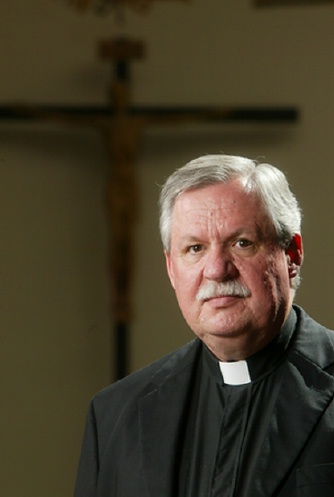In the Eucharist we celebrate the reality that Christ, who is Really Present, breaks the power of the sin and death in our lives, and the Father, in raising his Son into new life, pours yet new love upon his people, the Church, to give us peace.
We need Christ to save us from the power of sin and death because we cannot do this for ourselves. And so at the beginning of the Eucharist we ask for the Lord’s help: “Lord, have mercy…” Then, just as Jesus’ body is broken one more time and his blood poured out (“Lamb of God,…”), we admit one more time to the Lord how much we need his help: “Lord, I am unworthy to receive you...”
In other words, we are saying, “Lord, the sinfulness of the world that has hurt me so much keeps me from loving you and loving those who have hurt me. I can’t love, I can’t act justly, I can’t forgive, because I am too hurt, I am in too much pain.”
And, “Lord, not only can I not love nor act justly nor forgive, but I act in anger, I act unfairly, and I hate those who have hurt me. I don’t want to behave this way, but my own emotion is so intense.”
Having recognized that we suffer from sin done to us and sin we committed, we then make a statement of faith in Christ’s love for us and our belief that he will help us if we ask in faith: “…only say the word, and I shall be healed.” “I believe, Lord, that you desire to heal me and will heal me when I ask. So I am asking you now.”
The healing we ask for at this point in the Eucharist is the remedy for the damage created in us through the sin done to us and the sin we do. If we have trouble forgiving, the Lord’s healing helps us forgive. If we have trouble acting justly, the Lord’s healing helps us act justly. If we have trouble not responding in anger, the Lord’s healing helps us respond in peace.
Notice how concrete this healing is. We can begin the healing process even as we receive the Eucharist. As we continue this process, we can discover subtle changes in our interior selves if we are attentive. This healing not only can moderate our immediate anger, but the healing can moderate and drain away anger and other troublesome emotions that cling to our memories. Memories of childhood hurts, mistreatment, and sorrow can lose their sting, and we can come to leave in greater interior peace.
So, as we leave the place where we have celebrated the Eucharist, we have received a blessing from the Lord that can remain with us, especially as we renew that blessing through regular participation in the Eucharist, personal prayer, and spiritual conversation.
Friday, February 2, 2007
Subscribe to:
Post Comments (Atom)

4 comments:
The healing process is so long sometimes, depending on the depth of the wounds and the length of time those wounds were inflicted. The path can be very steep and full of twists and turns, with the abyss to one side and the imposing mountain wall on the other. All one can do is walk forward, one step at a time, and sometimes you just sit there and don't move at all, all wrapped up in yourself and your wounds. It's all part of the plan, though. Sometimes you find a sudden clearing, where you can get a glimpse of the sunny valley below. You can see where you've been and marvel at how you managed to get through it all. You can see that no matter how narrow the path seemed, there was always room for two: you and the Lord. You can take a deep breath of fresh air and gather strength to move forward again.
I want not agree on it. I assume nice post. Especially the designation attracted me to read the whole story.
Nice post and this mail helped me alot in my college assignement. Gratefulness you seeking your information.
[B]NZBsRus.com[/B]
Forget Laggin Downloads With NZB Files You Can Easily Search Movies, Games, MP3 Singles, Software & Download Them @ Electric Speeds
[URL=http://www.nzbsrus.com][B]Usenet[/B][/URL]
Post a Comment